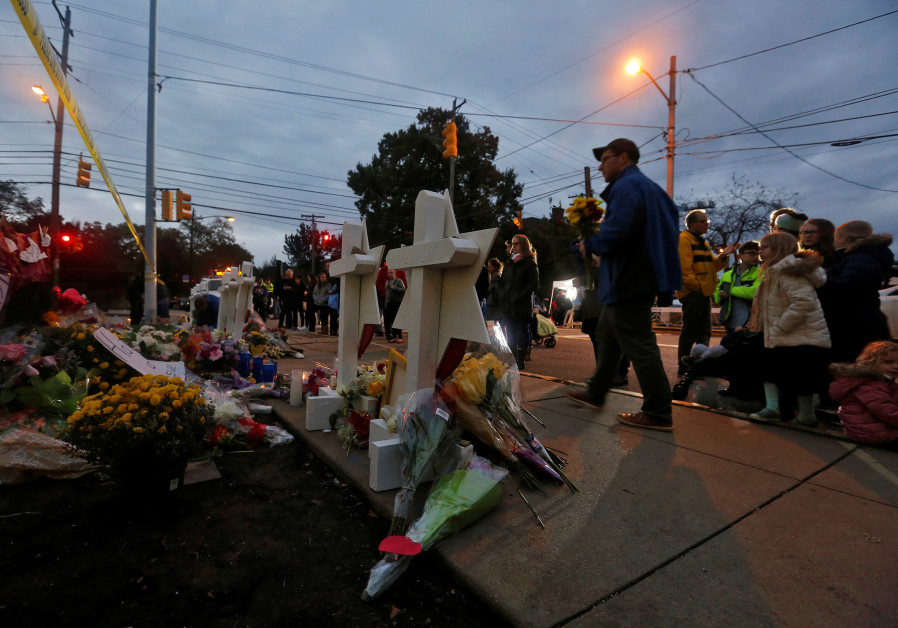‘I find it frightening that after all that’s happened to the Jews, this still goes on’

WASHINGTON – Alvin Berkun never misses shul on Saturdays at Tree of Life in Pittsburgh, where for decades he served as a rabbi and knows each congregant intimately. But on October 27, when his ailing wife asked him to stay at home by his side, he made an exception.
In doing so, she saved his life.
“I’ve known each of the deceased for probably 25 years, and everybody is pretty devastated,” said Berkun, who was in the process of calling the families of each victim as he spoke to The Jerusalem Post. Those who habitually sit near Berkun at services were all killed.
“Our congregation dates to 1864, and a lot of terrible things have happened over those years. I am confident we will bounce back,” he continued. “But who could imagine something like this happening?”
Berkun and his fellow rabbinical leaders are now stepping up their roles as healers of a community shaken by the deadliest antisemitic attack in American history. They expect it will be their greatest spiritual challenge yet, ushering families through funerals, shivas and – after the media spotlight fades – months and years of piercing absence.
As private funerals begin on Tuesday for the 11 who were murdered, leaders from other faiths are taking action to support families as well. In less than three days, a fund-raising campaign launched by two Muslim organizations, titled “Muslims Unite for Pittsburgh Synagogue,” raised more than $115,000 to help families with burial and medical expenses.
Tree of Life congregants describe the surrounding neighborhood of Squirrel Hill as an oasis for the observant – just the type of community that attracted Jews to America and has kept them there. Occupying a convenient corner of eastern Pittsburgh, Squirrel Hill provides religious Jews with a space near the city’s center to be themselves – to shop for kosher food and raise their children in Jewish schools and day care centers – in freedom and tranquility.
But that peace of mind has been shattered in an extraordinary act of violence by Robert Bowers, 46, who now faces the death penalty for his actions. Residents question how they can reclaim once-sacred ground from the damage inflicted by his assault.
“I find it very frightening that, after all that’s happened to the Jews, that this isn’t over – that this is still going on,” said Toby Neufeld, a teacher at Tree of Life for over 30 years. Neufeld’s parents are both Holocaust survivors. “And I don’t think we can avoid thinking about the shooter. It’s part of the whole picture, and it’s part of what’s happening in this country,” he said.
Neufeld was close friends with Daniel Stein, 71, who was one of the first congregants shot and killed on Saturday. He was a new grandfather and, in Neufeld’s words, a “sweet, low key, wonderful” man.
“Danny was helpful if you needed something. You could always call him,” he said. “He was very active in the synagogue. He could lead services if they needed him to. He’d organize trips – and we went on vacations with just him and his wife. Had dinners together. Went to their children’s bat mitzvahs.”
Squirrel Hill residents speak of their neighborhood as a deep-rooted community rattled to its core, but not easily dislodged; a Jewish refuge successfully terrorized yet buoyed in its tragedy by a supportive world, from reliable allies such as Israel and France, where the Knesset lit up in tricolor and the Eiffel Tower went dark in their honor, to unlikely capitals across the Arab world not often seen as friendly to the Jewish people.
And while politicians uncomfortable with or inconvenienced by talk of gun safety and racial bigotry in America sought to avoid both topics on the airwaves, those directly affected by the massacre were ready and anxious to discuss policy. Several Tree of Life congregants told the Post that they understood the need for armed guards in houses of worship – but only in reaction to their hopelessness that Washington would ever address the root of the problem, largely seen in Pittsburgh as the proliferation of semi-automatic weapons.
One congregant noted that the weapon used in Bowers’ shooting, an AR-15, was also used in 10 other mass casualty events in the past few years, including several shootings at religious institutions.
“I don’t think armed guards are really the answer to it,” Neufeld said. “But I think education is super important. I am a teacher, after all. You have to teach the children not to hate.”
As reported by The Jerusalem Post
